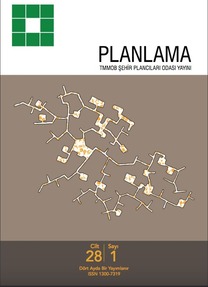Mekânsal Müdahale Süreçleri ve Mücadele Pratikleri
Spatial Intervention Processes and Practices of Struggle
___
- Binder, J.K. et al (2007) Towards an EU approach to democratic local governance, decentralisation and territorial development (background paper), Project No. 2007/147439 - Version 1; https://www.google.com.tr/ url?sa=t&rct=j&q=&esrc=s&source=web&cd=1&cad=rja&uact=8&v ed=0ahUKEwiR6-OT9snSAhUHWCwKHY11CVUQFggZMAA& url=http%3A%2F%2Fwww.3csc.it%2Findex.php%3Foption%3Dcom_ docman%26task%3Ddoc_download%26gid%3D144%26Itemid%3D1 25&usg=AFQjCNFqJplaPScShTPLPxnGKn1pxmjTxA&sig2=PFpl0 WotqBe_sRqfO8Wv8g&bvm=bv.149397726,bs.2,d.bGg
- Brenner, N., ve Theodore, N. (2002). Cities and the geographies of “actually existing neoliberalism”. Antipode, 34(3), 349-379.
- Brenner, N., ve Theodore, N., eds (2002). Spaces of Neo liberalism. Urban Restructuring in North America and Western Europe, Oxford: Blackwell Publishing.
- Casula, M. (2015) Opportunity Structures for Citizens’ Participation in Italian Regions: A Case Study, Journal of Public Deliberation, 11 (2), Article 6, http://www.publicdeliberation.net/jpd/vol11/iss2/art6
- CCR/CEMR (2008) Towards an EU approach to democratic local governance, decentralisation and territorial development. Response of the Council of European Municipalities and Regions (CEMR) to the European Commission’s issues paper, June 2008. (Erişim tarihi: 08.03.2017) http://www.ccre.org/img/uploads/piecesjointe/filename/Towards_an_ EU_approach_to_democratic_local_governance_fr.pdf
- Corcoran, M.P. (2002), “Place Attachment and Community Sentiment in Marginalised Neighbourhoods: A European Case Study”, Canadian Journal of Urban Research, vol. 11, no. 1, pp. 47.
- Fainstein, Susan S, (2000) New Directions in Planning Theory, Urban Affairs Review, 35: 451-478.
- Kozaman, S., İnal Çekiç, T. (2015), Kentsel Mekânı Biçimlendirmede Toplum Tabanlı Örgütlenmenin Rolü: Berlin Örneği, Bahar 2015, Sayı:53, Mimarist Dergisi, ss. 94-100
- Köhler, B. and Wissen, M. (2003), Glocalizing protest: urban conflicts and the global social movements. International Journal of Urban and Regional Research, 27: 942–951. doi:10.1111/j.0309-1317.2003.00493.x
- Mayer, M. (2000) Social movements in European cities: transitions from the 1970s to the 1990s, in Cities in contemporary Europe, A.Bagnascoand, P.LeGalés (Eds.), Cambridge University Press, Cambridge, 131-152.
- Marcelo Lopes de Souza (2006) Social movements as ‘critical urban planning’ agents, City, 10:3, 327-342, DOI: 10.1080/13604810600982347
- Monno, V., & Khakee, A. (2012). Tokenism or political activism? Some reflections on participatory planning. International Planning Studies, 17(1), 85-101.
- Ökten, Ayşe Nur; Erhan Kurtarır ve Tuba nal Çekiç (2013). “Katılımın Yokluğunda Gezi’de Direniş”, Planlama Dergisi, TMMOB (Türk Mühendis ve Mimar Odaları Birliği) Şehir Plancıları Odası Yayını, C. 23, S. 1, s. 45-51.
- Peter Marcuse (2009) From critical urban theory to the right to the city, City, 13:2-3, 185-197, DOI: 10.1080/13604810902982177
- Smith, N. (2002) New Globalism, New Urbanism: Gentrification as Global Urban Strategy. Brenner, N., & Theodore, N., eds (2002) içinde Chapter 4, s.80-103.
- Swyngedouw, E., Moulaert, F., Rodriguez, A. (2002) Neoliberal Urbanization in Europe: Large-Scale Urban Development Projects and the New Urban Policy, Brenner, N., & Theodore, N., eds (2002) içinde Chapter 9, s.226-7.
- Velasco, M. (2000) Promoting Participatory Local Governance (a monograph), The Hague: IULA, 1999.
- ISSN: 1300-7319
- Yayın Aralığı: 3
- Başlangıç: 1986
- Yayıncı: TMMOB Şehir Plancıları Odası
Bursa Örneğinde Kentsel Büyümenin Yerel İklim Değişikliği Üzerine Etkisi
Mortaza MORADİ, NİLGÜN GÖRER TAMER
Mekânsal Müdahale Süreçleri ve Mücadele Pratikleri
Tuba İnal ÇEKİÇ, ERHAN KURTARIR, Ayşe Nur ÖKTEN, SENEM KOZAMAN
Karmaşık Kentler ve Planlamada Karmaşıklık
Kentsel Mekân Üretiminde ‘Kendin Yap’ Hareketi
İlgi̇ ATAY KAYA, Esra Kut GÖRGÜN
Kent Kimliğinin Oluşumunda Kentsel Bellek ve Kentsel Mekan İlişkisi: Mersin Örneği
